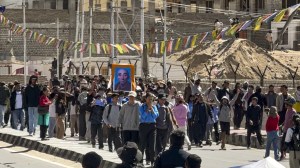Bank on blood banks to let you down
NEW DELHI, March 3: Another life was lost for want of blood at a private nursing home in central Delhi yesterday, when a 26-year-old pregnan...

NEW DELHI, March 3: Another life was lost for want of blood at a private nursing home in central Delhi yesterday, when a 26-year-old pregnant woman died due to excessive bleeding.
Komal Sharma was rushed to the nursing home in the wee hours with acute labour pain. After a normal delivery, she started bleeding profusely.
The doctors recommended immediate blood transfusion and Sharma’s family rushed to the regional blood bank at the Lok Nayak Hospital. However, by the time the blood could be arranged for, it was too late. The patient’s family have now approached the police, blaming the doctors for Komal’s death.
This case has come close on the heals of a similar incident which took place in west Delhi. A young mother died on February 4, within hours of delivering twin girls prematurely after blood bank authorities at the Deen Dayal Upadhyay Hospital made the family members run all over the city in search of the life-saving fluid.
In Komal’s case, the doctors demanded blood for transfusion at around 4am.
Blood bank authorities allegedly turned the family down first because the patient’s blood sample was brought in a vial instead of a test tube and because the blood requisition form did not carry the seal of the nursing home. Considerable time was lost in the blood bank’s insistence on four donors before blood of the requisite group could be spared.
In their complaint, the family has alleged that the doctors attending the patient were negligent and did not provide Komal with treatment in time.
Following the complaint, the police have sent Komal’s body for post-mortem.
The medical director of the nursing home, when contacted, maintained that the victim had suffered post-portem haemorrhage (PPH), a condition wherein the uterus doesn’t retract after delivery.
This, he said, led to excessive blood loss which could not be compensated for in time, despite the doctors" effort to buy time with the help of plasma expanders.
Komal’s case has once again brought to the fore a serious malady affecting thecity’s blood banking system.
Though the authorities have repeatedly been assuring that the Supreme Court ban on professional blood donors, effective from December 31 last year, has not caused any crisis of blood, nothing is being done to improve the functioning of the existing blood banks.
Even the ambitious plan to computerise all the blood banks and link them together so that the availability of various blood groups at all the banks could be ascertained from anywhere with the touch of a button is still gathering dust.





- 01
- 02
- 03
- 04
- 05


























